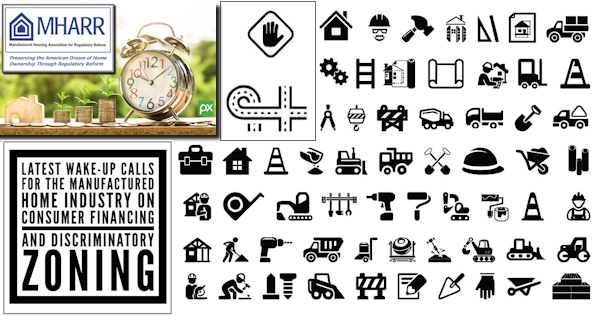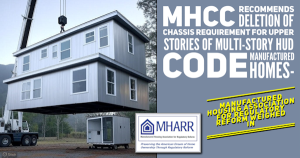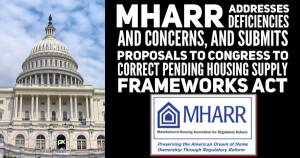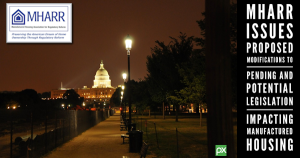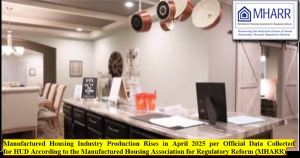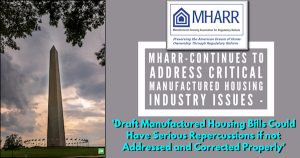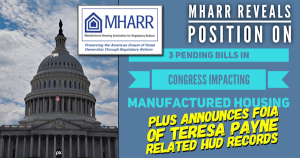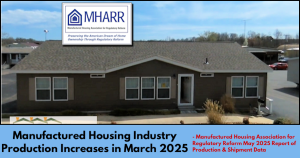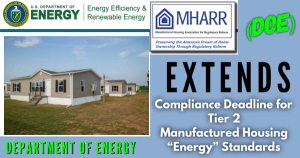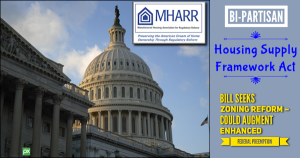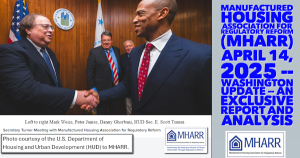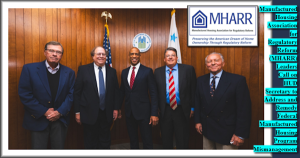FEBRUARY 23, 2023
TO: HUD CODE MANUFACTURED HOUSING INDUSTRY MEMBERS
FROM: MHARR
RE: LATEST WAKE-UP CALLS FOR THE INDUSTRY ON CONSUMER FINANCING AND DISCRIMINATORY ZONING
Both the double-digit contraction of the HUD Code manufactured housing market during the last quarter of 2022 and the continuing stagnation of the broader market at levels far below the documented need for millions of affordable housing in the United States, illustrates the continuing negative impact of two key issues – (1) the lack of federal support for largest single component of the manufactured housing consumer financing market (i.e., chattel lending); and (2) the lack of concrete federal action to eliminate discriminatory zoning barriers against affordable HUD Code housing, as well as the ongoing failure of the industry’s post-production national representation (i.e., the Manufactured Housing Institute) to take aggressive, assertive and definitive action to confront and resolve these matters.
Each of the items addressed below, illustrate just the latest and most recent instances of the failure of the federal government to ensure the equal and equitable treatment of manufactured housing – and manufactured housing consumers – within the post-production realm, as well as the failure of the post-production sector’s national representation to effectively address those issues. These fundamental roadblocks to the greater utilization of affordable HUD Code homes, in turn, as was addressed in MHARR’s July 2022 White Paper, “The Exploitation of Federal Housing Finance and Mortgage Funding Assistance Housing Programs and Potential Solutions” (copy attached), effectively ensure that the billions of dollars being spent by the Biden Administration on affordable housing programs and initiatives do not reach the ground in relation to manufactured housing and do not benefit either actual or potential manufactured housing purchasers. With production thus being needlessly suppressed by these factors, and with at least two more years of elevated Biden Administration housing expenditures lying ahead, the broader industry must insist on more assertive and more effective action on these matters by MHI. Put differently, affordable HUD Code manufactured housing cannot fulfill its statutorily-recognized role as a prime source of affordable homeownership so long as new communities cannot be developed and new homes cannot be financed due to continuing zoning and consumer financing discrimination that is already prohibited by federal law (i.e., the “Duty to Serve” provision of the Housing and Economic Recovery Act of 2008 and the enhanced federal preemption of the Manufactured Housing Improvement Act of 2000). Instead, action needs to be taken to enforce those laws for the benefit of both the industry and consumers.
FANNIE AND FREDDIE MODIFIED “DUTY TO SERVE” PLANS CONTINUE TO DENY FULLY-COMPETITIVE CONSUMER LENDING TO 80% OF MH MARKET
The Federal Housing Finance Agency (FHFA) – the federal agency responsible for the implementation of the Duty to Serve Underserved Markets (DTS) provision of the Housing and Economic Recovery Act of 2008 (HERA) — has published the latest approved revisions to the current 2022-2024 DTS plans submitted by mortgage giants Fannie Mae and Freddie Mac. While these revisions will have some relatively minor impacts on the manufactured housing market, they totally fail to address the complete absence of manufactured housing chattel loan support in the Fannie Mae DTS plan, or Freddie Mac’s ongoing delay of any DTS chattel loan support until the last year of its plan under a token pilot program that could still be deleted prior to implementation, as has been the case with previous proffered chattel loan “pilot” programs. MHARR has consistently cited this failure to provide essential support for the vast bulk of the manufactured housing finance market in comments that it has submitted to FHFA and its engagement with senior FHFA officials.
Under Fannie Mae’s plan revisions, the structure of its DTS lending program for resident-owned, non-profit or government-owned manufactured housing communities would be altered by eliminating specific performance subcategories for the three different types of ownership and instead aggregating all into one over-arching, omnibus target. Beyond this structural change, the update would also decrease Fannie Mae’s targets for loan purchases of manufactured home communities with “tenant site lease protections” over the entire three-year DTS plan period, based on alleged “constraints in the macroeconomic environment” with “MHC sales during the first half of 2021 … on pace for the lowest annual sales activity since 2017.” Meanwhile, Fannie Mae’s DTS plan makes no provision whatsoever for support of the nearly 80% of manufactured housing purchase loans – disproportionately relied-upon by lower income minority groups – financed and titled as chattel.
For its part, Freddie Mac’s DTS plan revisions will increase targets for purchases of loans on manufactured homes titled as real property and communities with tenant pad lease protections, but does not increase or move forward in time its minimal 2024 chattel loan purchase pilot program.
In summary, then, some 15 years after the adoption of the statutory Duty to Serve mandate, the Government Sponsored Enterprises (GSEs) have purchased and/or otherwise supported through DTS exactly zero manufactured home purchase chattel loans – despite being expressly authorized by Congress to do so. Effectively, therefore, both Fannie Mae and Freddie Mac – and FHFA as their federal regulator – have totally neglected and ignored the nearly 80% of the affordable manufactured housing market served by personal property lending (according to U.S. Census Bureau data) and the millions of Americans who seek (and are being denied) access to the nation’s leading source of affordable homeownership. This complete and contemptuous ongoing failure on the part of both the GSEs and FHFA deserves thorough congressional oversight, including a hearing requiring them to provide specific answers and remedies for their longstanding failure to comply with applicable law.
HUD CONTINUES TO IGNORE ANTI-MH DISCRIMINATORY ZONING
The U.S. Department of Housing and Urban Development (HUD) has issued the latest proposed iteration of its so-called “Affirmatively Furthering Fair Housing” (AFFH) rule. Under the proposed rule, published in the Federal Register on February 9, 2023, states and localities would be required to develop and implement “Equity Plans” designed not only to prevent housing discrimination against “protected classes,” but to also “proactively take meaningful actions to overcome patterns of segregation, promote fair housing choice, eliminate disparities in housing-related opportunities and foster inclusive communities that are free from discrimination.”
Insofar as the AFFH proposed rule – like previous proposed versions — specifically cites restrictive “land use and zoning ordinances” as factors that “impede the development and maintenance of affordable housing commensurate with need,” MHARR has consistently called for the use of regulatory powers conferred by AFFH and the enhanced federal preemption of the Manufactured Housing Improvement Act of 2000 to promote zoning that allows for the liberal siting and utilization of HUD Code manufactured homes and, where needed, the invalidation of zoning mandates that discriminatorily exclude or restrict the placement of affordable manufactured homes.
For example, in October 11, 2018 comments, MHARR urged HUD, in modifying its AFFH regulations to: “(1) apply a modified AFFH structure to, among other things, seek the elimination of local zoning or placement ordinances that discriminatorily exclude or limit the placement of HUD-regulated manufactured homes and/or manufactured housing communities in compatible areas; (2) seek to prevent the adoption of any additional ordinances or measures of that type and/or effect; and (3) failing voluntary local compliance with such criteria, take action to federally preempt such ordinances or measures” under the authority provided by both AFFH and the enhanced federal preemption of the 2000 reform law.
Insofar as discriminatory and exclusionary zoning continues to needlessly and baselessly restrict the role that manufactured housing otherwise would – and should – fulfill in meeting the nation’s need for affordable homeownership and non-discriminatory access for all Americans to such homeownership, and continues to prevent manufactured housing from fully and effectively participating in all federal government housing and homeownership programs, as detailed in MHARR’s July 2022 White Paper (“The Exploitation of Federal Housing Finance and Mortgage Funding Assistance Programs and Potential Solutions”), MHARR will submit comments in this rulemaking again urging the adoption of measures and requirements that would allow for the invalidation of such zoning mandates.
Comments in response to the AFFH proposed rule are due on or before April 10, 2023. MHARR urges all manufactured housing industry members to submit comments and will publish its own submission in advance for use and/or citation by other industry members.
That said, while MHARR will address both AFFH and DTS at its upcoming Board of Directors meeting, the broader industry should and, indeed, must take the opportunity to address and remedy these fundamental roadblocks to greater industry production and a more readily-available supply of affordable housing for all Americans, as is addressed in MHARR’s above-referenced White Paper.
cc: Other Manufactured Housing Stakeholders and Officials
Attachments – MHARR White Paper Cover Memo and MHARR White Paper July 2022.
Manufactured Housing Association for Regulatory Reform (MHARR)
1331 Pennsylvania Ave N.W., Suite 512
Washington D.C. 20004
Phone: 202/783-4087
Fax: 202/783-4075
Email: MHARR@MHARRPUBLICATIONS.COM
Website: manufacturedhousingassociation.org
MHARR White Paper Exposes Public Relations Exploitation Notwithstanding Continuing Industry Failures

